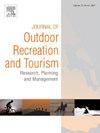接受也好,不接受也罢:经常徒步旅行的人在富士山的行为是更负责任还是更离经叛道?
IF 4.4
3区 管理学
Q1 HOSPITALITY, LEISURE, SPORT & TOURISM
Journal of Outdoor Recreation and Tourism-Research Planning and Management
Pub Date : 2025-10-07
DOI:10.1016/j.jort.2025.100958
引用次数: 0
摘要
更好地了解反常的游客行为有助于减轻对保护区的环境和文化影响。除了徒步旅行者扔的垃圾外,非法纪念品和故意破坏行为也给景点管理人员带来了问题,尤其是在山区。这项研究考察了徒步旅行者对越轨行为的看法,比如在自称遵守富士山小径“不留痕迹”(LNT)原则的背景下,带走山渣和留下涂鸦。在进行了两个夏季(2023-2024)的现场问卷调查后,使用独立样本t检验和单向多变量协方差分析(MANCOVA)相结合的方法来检验525名受访者对LNT认知的差异。结果显示,在徒步旅行者中,他们的常规徒步旅行经历与涂鸦规范之间存在显著差距。结果还确定了异常行为与收集矿渣作为非法纪念品之间的联系。单向方差分析表明,先前的富士徒步旅行经验是影响徒步旅行者收集遗骨行为的显著协方差之一。这一发现可能有助于公园管理者设计有针对性的教育推广项目,以阻止徒步旅行者的文化影响,比如带走山石和留下涂鸦。本文章由计算机程序翻译,如有差异,请以英文原文为准。
Take it or leave it: do regular hikers tend toward more responsible or deviant behaviour at Mount Fuji?
A better understanding of deviant tourist behaviour could help mitigate environmental and cultural impacts on protected areas. Aside from trash thrown by hikers, illicit mementoes and vandalism pose problems for site managers, especially in mountainous areas. This study examines hikers' perceptions of deviant behaviours such as taking scoria and leaving graffiti in the context of self-stated compliance with the ‘Leave No Trace’ (LNT) Principles on Mount Fuji's trails. After an on-site questionnaire was conducted over two summer seasons (2023–2024), a combination of independent sample t-tests and one-way Multivariate Analysis of Covariance (MANCOVA) was used to examine differences in LNT perceptions among the 525 respondents. Results revealed significant gaps among hikers linking their regular hiking experience with graffiti norms. Results also identified a link between deviant behaviour and collection of scoria as an illicit memento. A one-way MANCOVA indicated that prior experience hiking Fuji is amongst the significant covariances that influence hikers' scoria-collection behaviour. The findings may assist park managers in designing targeted educational outreach programs that discourage hikers' cultural impacts such as taking scoria and leaving graffiti.
求助全文
通过发布文献求助,成功后即可免费获取论文全文。
去求助
来源期刊

Journal of Outdoor Recreation and Tourism-Research Planning and Management
HOSPITALITY, LEISURE, SPORT & TOURISM-
CiteScore
6.70
自引率
5.30%
发文量
84
期刊介绍:
Journal of Outdoor Recreation and Tourism offers a dedicated outlet for research relevant to social sciences and natural resources. The journal publishes peer reviewed original research on all aspects of outdoor recreation planning and management, covering the entire spectrum of settings from wilderness to urban outdoor recreation opportunities. It also focuses on new products and findings in nature based tourism and park management. JORT is an interdisciplinary and transdisciplinary journal, articles may focus on any aspect of theory, method, or concept of outdoor recreation research, planning or management, and interdisciplinary work is especially welcome, and may be of a theoretical and/or a case study nature. Depending on the topic of investigation, articles may be positioned within one academic discipline, or draw from several disciplines in an integrative manner, with overarching relevance to social sciences and natural resources. JORT is international in scope and attracts scholars from all reaches of the world to facilitate the exchange of ideas. As such, the journal enhances understanding of scientific knowledge, empirical results, and practitioners'' needs. Therefore in JORT each article is accompanied by an executive summary, written by the editors or authors, highlighting the planning and management relevant aspects of the article.
 求助内容:
求助内容: 应助结果提醒方式:
应助结果提醒方式:


